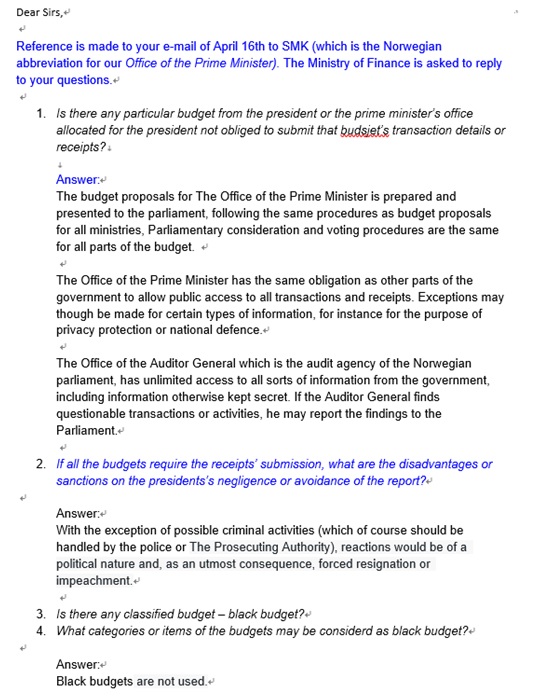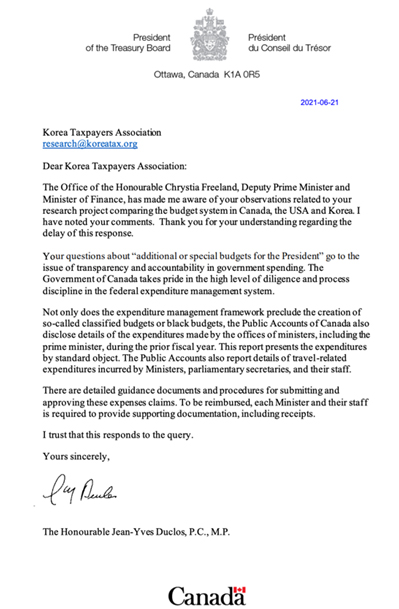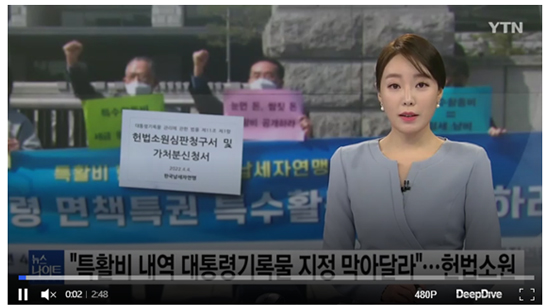
 단체소개
단체소개  단체개요
단체개요  세계납세자연맹
세계납세자연맹

- The purpose of the campaign is that the receipts must be submitted even to the usage of the budget spent on the ‘confidential reasons’.
- According to the budget guidance of the South Korean government, the government budget without receipts is defined as “expenditures directly spent for information, investigation, and other similar diplomatic and security activities of the government in confidentiality”.
- According to the guidelines of the Board of Audit and Inspection, government budgets without receipts should, in principle, be submitted/reported with receipts attached. However, exceptions are made when the following criteria are met:
a) When payment with cash is available; and,
b) When there can be a consequential influence on the purpose of the expenditure on its disclosure, for example, the budget used for investigation or data collection activities
In the case which meets both conditions, the date, amount, purpose, and recipient of the expenditure may be omitted from the submission/report.
The vulnerability in the exception is often exploited by the government authorities who spend budgets with cash, submit to the auditory board without the receipts of expenditure, and label the information as confidential. In fact, the Auditory board checks the misuse of ‘government budget without receipts’ as a mere formality within the guideline made with the referent government body which spends the budget; but cannot scrutinize it in practice as it is not underpinned by the system being restricted by the guideline.
- 195million USDwas distributed in the year 2022
- The budget is available for 16 government bodies: the Blue House, the Auditory board, Police, Ministry of Science and ICT, Korea Customs Service, Office of the Prime Minister, Ministry of Defense, National Tax Service, Ministry of Justice, Ministry of Foreign Affairs, Ministry of Unification, Maritime Police Agency, Investigation Office for Senior Officials, etc.
- The ‘the budget’ was initially designed for confidential tasks but has not been used forits purpose.
- The budget is distributed to the irrelevant government bodies such the Congress, Ministry of Science and ICT and the National Tax Agency etc.
- The budget is usually utilized by higher officials such as the president and prime minister.
- 15 million USD is annually allocated to the Blue House, which has not been never disclosed where it was spent. However, it is assumed that the budget is used for allowance for the president (who would supposedly use it as incentives to the army units on the president’s visit, gifts to the citizens on national holidays, and hospitality to foreign envoys)
* The previous Park administration used the budget as incentives for secretaries (4074 USDper month) and lower rank officers (407 USD per month)
- private use of this budget cannot be properly inspected by the citizens (e.g., ombusam and other transparency organizations) as it is used with cash and does not require the receipts
- Using the budget with cash increases tax evasion and tax fraud
- KTA argues that using the budget without the receipts even when the receipts are available to issue and submit is a privilege of the public sector, particularly of the higher officials, andexploitation of the legal vulnerability in the budget system. The facts above are the motives for the abolishment campaign of this unnecessary budget.
There have been multiple cases reported by media that this budget is used by higher officials for their living expenses and family members (e.g., study abroad).
TThe Act was introduced in 1988 in South Korea and consists of 15 pages providing abstract and vague clauses.
For example, the reasons for confidentialityare specified as national security and internal review, but without specific definitions and explanations regarding such as ethics, storage, and clearance. This implies that the Act allows the exploitations of the legal framework by interpreting it arbitrarily ? the Act gives considerable discretion for public officials and authorities in labeling information and activities as ‘confidential’. This Act can be rather seen as the Act for the ‘pretext and excuse’.
KTA insists the abolishment of this budget in order for freedom of information and transparent use of taxes. KTA is currently in the process of litigation against the Blue House.
On the 28th of June 2018, KTA requested the release of information regarding the following three:
- The date, amount, reason, recipient, and method of ‘the budget’ distributed to the Moon administration since their embarkment
- The amount and detail of ‘the budget’ distributed for the protocol and ceremonies of the first lady and the president in terms of clothes, accessories, shoes, etc.
- The price of the lunch boxes in the workshop held by Moon administration on the 30th of January 2018.
11 July 2018: the Blue House rejected the request from KTA.
25 March 2019: KTA filed an administrative ligation.
10 February 2022: the Court ruled in favor of KTA and ordered all three of the above to be disclosed, citing that “if the loss of the right to know and the violation of transparent government operation due to nondisclosure is greater than the benefit of nondisclosure, it does not fall under the reason for nondisclosure.”.
2 March 2022: the Blue House appealed.
4 April 2022: KTA filed constitutional complaint that the Presidential Records Act is unconstitutional, and application for injunction to suspend the transfer of documents of information that has been decided to disclose information
- When the current President Moon Jae-in's term of office ends on May 9, the “three information-related documents that were judged to be disclosed by the court of first instance” can be designated as presidential records and transferred to the presidential archivesaccording to the Presidential Records Act. If the documents are designated as presidential documents, they will be kept private for at least 15 years and up to 30 years.
- In a case similar to this case, the High Court dismissed the lawsuit on the ground that "there are no related documents because the documents in the Blue House were transferred to the archives." Therefore, it is highly likely that the appeal in this case will also be dismissed.
- The Seoul High Court’s decision on February 21, 2019, 2018nu59672, states, “Presidential-designated records are not permitted to be viewed or copied without following the procedures stipulated by the law during the designated protection period, It is reasonable to view that it is not included in the subject of the request for data submission”.
- Therefore, if information that has been judged to be disclosed is converted to 'Presidential Records', the disclosure will not be made for minimum of 19 to maximumof 34 years from the date of the request for information disclosure.In this context, the unreasonable result that 'the Act on Information Disclosure does not apply to the President’ may occur ? it becomes the question concerning equality, transparency, and effectiveness of the law.
- The information of the president, which should be subject to the most monitoring and checks (criticism) among the state powers, is consequently concealed. In addition, the result is an unconstitutional situation that violates the people's right to know in that it goes against the purpose of the enactment of the Presidential Records Act.
* Article 1 of the Presidential Records Archives Act
The purpose of this Act is to enhance transparency and accountability in the management of state affairs by prescribing matters necessary for the efficient management of presidential records, such as protection, preservation, and utilization of presidential records, and the establishment and operation of the Presidential Archives.
During the first trial, KTA sent a letter asking if there is a related budget system designed for the Prime Minister('s Office) of seven countries, including the United States, United Kingdom, Germany, France, Canada, Sweden, and Norway. Of the seven countries, Norway, Canada, and France responded.
a) Norway

b) Canada

c) France: the secret budget for the presidential office was abolished in 2002. Seven ministries related to national security have confidential budgets. This confidential budget is audited by a special committee of Parliament.
The campaign was publicized and highlighted by key media in the country and thus considered to have a crucial impact on public opinion regarding the presidential election last month. The elected resulted in a regime shift from the progressive party to the conservative party. The news articles and reports are still published and aired on ‘the budget’ as the main topic up to this date. One of the articles can be found in the following link:












